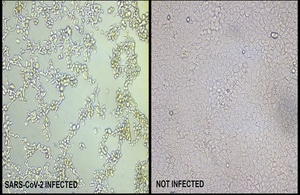Dstl release research on stability of COVID-19 in the air


Comparison of cells with and without infection of the SARS-CoV-2 virus (compressed image)
The Defence Science and Technology Laboratory (Dstl) has published a
research paper on the stability of the COVID-19 virus in the air through
the Emerging Microbes and Infections journal.
The paper “Experimental aerosol survival of SARS-CoV-2 in artificial
saliva and tissue culture media at medium and high humidity”, written by
a team of Dstl scientists, outlines the research completed on the
stability of the COVID-19 virus in the air. It also supports the
scientific advice provided to the Government on COVID-19 control
measures.
The findings indicate that the COVID-19 virus may remain viable in
the dark for at least 90 minutes under certain conditions, if produced
within small-particle aerosols. These findings provide direct,
corroborating evidence that will help inform how the virus behaves
within healthcare environments.
Coughing and sneezing generally produce large particles of saliva,
but smaller particles will also be produced. Small particles are also
produced during routine activities such as talking and breathing.
Smaller aerosol particles may be of concern because they may stay
buoyant in the air for longer, travel further and be able to penetrate
further into the respiratory tract when inhaled.
Dstl, the science inside UK national security, has used its capability to investigate the generation of virus-containing particles to study the survival of the virus under different conditions. The research paper has also been shared with the Science Advisory Group for Emergencies (SAGE) and can be viewed here.
https://www.tandfonline.com/doi/full/10.1080/22221751.2020.1777906





